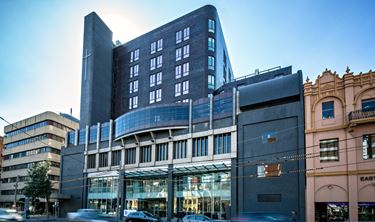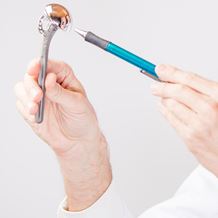Reverse Total Shoulder Replacement
- Home
- Services
- Orthopaedics
- Shoulder Orthopaedics
- Shoulder Replacement
- Reverse Total Shoulder Replacement
What is reverse total shoulder replacement?
This advanced surgical technique is specifically designed for patients suffering from severe arthritis or rotator cuff tears, who would most likely still experience some pain or limited movement after a standard total shoulder replacement. The operation is similar to a total shoulder replacement in that both the ball and socket are replaced with artificial parts, but in this advanced procedure their natural placement is reversed. The humeral ball at the top of the arm bone is placed in the cavity of the shoulder blade (scapula) and the artificial socket is placed on top of the arm bone.
Reverse shoulder replacement surgery relieves pressure on the rotator cuff by encouraging the large shoulder (deltoid) muscles to support the shoulder movement, instead of the rotator cuff tendons. If the rotator cuff is severely damaged, reverse shoulder replacement would be the preferred surgical option and may also be recommended as an alternative for patients who have already had a failed shoulder replacement.
Is it right for me?
The primary reason to consider a reverse shoulder replacement is to relieve ongoing pain caused by supporting muscles and tendons no longer functioning effectively. It is an elective procedure that anyone who suffers from painful shoulder arthritis and damaged rotator cuffs may be advised to consider, as a normal shoulder replacement can only work successfully with these tendons intact.
A rotator cuff may suffer damage for various reasons that include injury, wear and tear or degenerative arthritis. As the cuff deteriorates, it can lead to joint instability, friction and shoulder arthritis (rotator cuff arthropathy). Additionally, patients frequently suffer from stiffness, weakness in the joint and ongoing pain, both day and night, that cannot be alleviated through medication or rest. Whilst the surgery will not repair damage to the rotator cuff, patients are likely to benefit from less pain, greater movement and improved strength. Reverse shoulder replacement surgery may also be recommended if a traditional shoulder replacement has failed as a result of loosening or damage to the rotator cuff.

Shoulder replacement approaches

How much will my shoulder surgery cost?
Understanding the cost of your treatment is an important consideration before committing to surgery, but it’s not always easy to find the information you need. Learn more about the factors which contribute to the cost of your surgery:
What will my treatment and recovery look like?
Familiarising yourself with your treatment program and understanding the recovery process are important steps to take on the pathway to surgery.

Find a hospital with orthopaedic services
Our Hospitals



